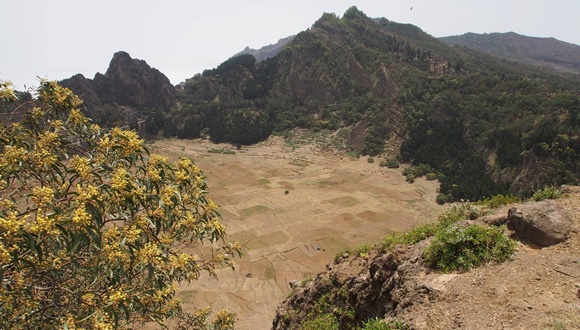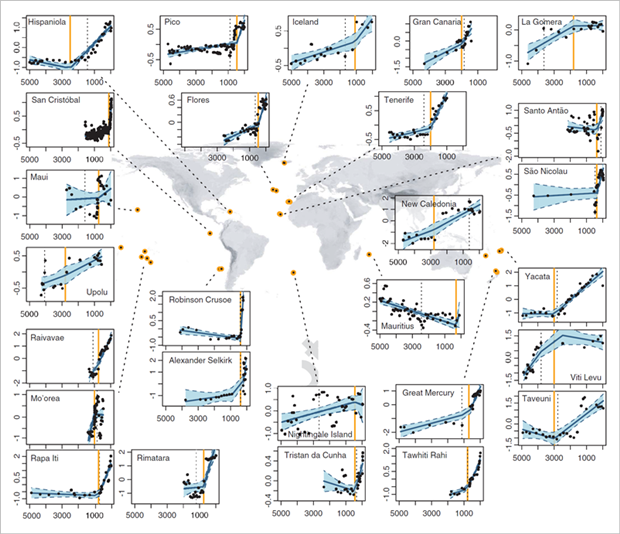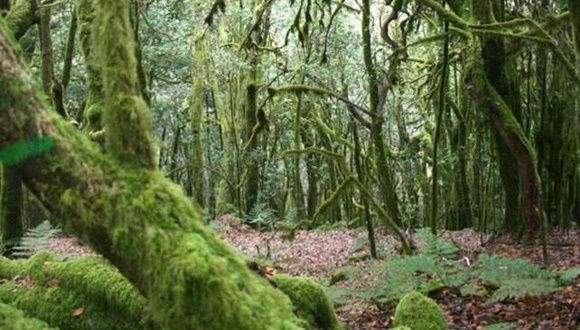Human settlement causes changes in the plant biodiversity of islands around the world 11 times more intense than the climate
Iceland was colonized about 1,000 years ago by Vikings, a navigating people who turned the economy upside down. Newcomers also left a mark on the natural environment that would never be erased again, as did many other people who have colonized islands around the world.
The raw materials and resources offered by the remote island in the Arctic Ocean aroused a strong interest in the newcomers, who would forever influence the economy of the area, northern Europe and almost the whole world. But the Vikings left an imprint on Iceland's natural environment that would never be erased again, like many of the other peoples who colonised islands around the world.
In Iceland, although the rate of change in an ecosystem's plant-life is linked to the climate prior to the arrival of humans, from the year 920 onwards the activity of the first settlers accelerated changes in the plant biodiversity, intensified erosion and destroyed forests in favour of pastures. The wood needed to build boats, the stone and metal of an island so rich in resources were plundered for years.
Today, most inhabited islands around the world have undergone at least two different waves of settlement, each with its own characteristic changes and increasingly complex legacy. This is due to the irreversible nature of the changes that have occurred, which are becoming faster and faster.

The article 'The human dimension of biodiversity changes on islands’ published at the end of April 2021 in the journal Science indicates that changes in the plant life of an island ecosystem caused by human colonisation are 11 times greater than those due to climate or effects such as predicted volcanic eruptions. The research has been carried out on 27 islands around the world.

This modification caused by human action is irreversible and is constantly reproducing itself, centuries after colonisation by humans. The first author of the article is the researcher Sandra Nogué, from the Southampton University (United Kingdom), who analysed the data and shaped the work while she was a visiting researcher at CREAF, when she collaborated with researcher Josep Peñuelas. The study involves an international team of professionals from all over the world, including Manuel Steinbauer, who co-led the paper, researcher at the University of Bayreuth (Germany) and at the University of Bergen (Norway).
The islands, an ideal laboratory
It is one of the first times that human impact on a landscape is quantified. It has been made possible by analyzing fossilized pollen from 5,000 years ago extracted from sediments.
The study is one of the first times it has been possible to quantify the human impact on a landscape, as until now it has been difficult to separate the effects of climate and other environmental impacts on continental masses from those caused by early humans. The research team has studied fossilised pollen from 5,000 years ago, extracted from sediments from the 27 islands, which has allowed them to understand the composition of the vegetation on each island and how it changed from the oldest pollen samples to the most recent ones.
"The islands are ideal laboratories for measuring human impact," says Sandra Nogué, "as most of them were colonised in the last 3,000 years, when the climates were similar to today. Knowing when an isolated territory was colonised facilitates the scientific study of the changes in the composition of its ecosystem in earlier and later years, and provides an idea of its magnitude".
For this reason it has been key to know that the population of the Polynesian islands arrived 3,000 years ago to remote islands such as Poor Knight (New Zealand, South Pacific Ocean) and also to Fiji (South Pacific); that in 2,800 years ago they arrived in New Caledonia (Pacific), and 370 years ago Europeans landed at Cabo Verde (North Atlantic), considered the first tropical European colony in the Atlantic. And, for example, on some islands in the archipelago of the Canary Islands (Atlantic Ocean), the European population arrived between 1,800 and 2,000 years ago, while on the Mauritius Islands (Indian Ocean), European settlers arrived only 302 years ago.

"Those that were colonised by more modern populations, such as the Galapagos Islands (Equator, Pacific Ocean, first inhabited in the 16th century) or the New Zealand Poor Knight, had a greater impact on their environment," exposes Nogué. "On the other hand, the occupied areas were previously inhabited by more primitive populations, who developed a life more closely linked to the natural rhythm and more sustainable and, therefore, the territory was more resilient to human setllement". For example, the study shows that the islands where humans arrived more than 1,500 years ago, such as Fiji and New Caledonia, experienced a slower rate of change.
"This difference in change could mean that the previously populated islands were more resistant to the arrival of humans. But it is more likely that the land-use practices, technology and species introduced by the later settlers were more transformative than those of the earlier ones," explains the lead researcher of the study.

"This scientific study can help guide restoration efforts and understand the territory's ability to respond to change".
JOSEP PEÑUELAS, researcher at CREAF.
Although it is not possible to expect the ecosystems to recover the situation before the settlements, the work can help to "guide restoration efforts and to understand the capacity of the territory to respond to change", in the words of Josep Peñuelas.
From Fiji to Cabo Verde
The research team has found that human disturbances outweigh natural phenomena and the changes they cause are often irreversible.
The trends were observed in geographic locations and climates as diverse as those of the South Pacific Ocean, the Indian Ocean, the South Atlantic and the Arctic Ocean, among others. Changes in ecosystems can also be due to various natural factors, such as earthquakes, volcanic eruptions, extreme weather conditions and changes in sea level. However, the research team has found that the disturbances caused by humans outweigh all these phenomena and the change is often irreversible. For this reason, they recommend that conservation strategies take into account the long-term impact of humans and the extent to which current ecological changes differ from those of pre-human times.
The results show little evidence that the ecosystems affected by humans resemble the dynamics present before their arrival. Therefore, anthropogenic impacts on islands are long-lasting components of these systems that usually involve an initial cleansing (for example, through the use of fire), and are compounded by the introduction of a range of species and the extinction of endemic ones, in addition to ongoing disturbance.







